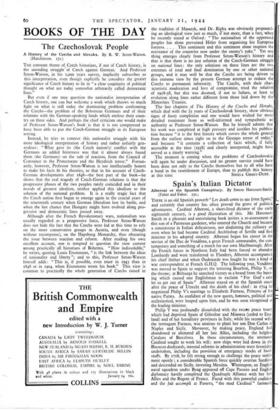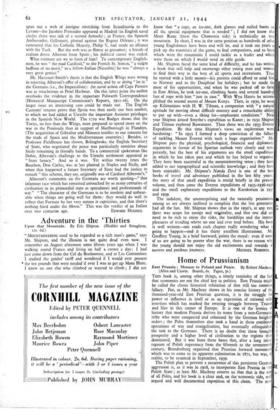Spain's Italian Dictator
THERE is an old Spanish proverb " Let death come to me from Spain," and certainly that country has often proved the grave of political adventurers. Cardinal Alberoni, a short-lived dictator of the early eighteenth century, is a good illustration of this. Mr. Harcourt- Smith in a pleasant and entertaining book invites a re-assessment of this son of a Parmesan gardener, who entered the Church and became a connoisseur in Italian delicatessen' not disdaining the culinary art even when he had become Cardinal Archbishop of Seville and first minister in his adopted country. Alberoni began his career in the service of the Duc de Vendome, a great French commander, the con- temporary and something of a match for our own Marlborough. After the French forces in Northern Italy had been forced to abandon Lombardy and were transferred to Flanders, Alberoni accompanied his chief thither and when Oudenarde was fought he was a kind of war correspondent at French G.H.Q. The following year, Vendome was moved to Spain to support the tottering Bourbon, Philip V, on the throne; at Brihuega he snatched victory as a brand from the burn- ing which caused one Englishman to exclaim " For God' s sake let us get out of Spain." Alberoni stayed on at the Spanish court after the peace of Utrecht and the death of his chief : in 1714 he negotiated Philip V's marriage to Elizabeth Farnese, Princess of his native Parma. As confidant of the new queen, honours, political and ecclesiastical, were heaped upon him, and he was soon recognised as the leading minister.
Philip V was profoundly dissatisfied with the recerit peace treaty which had deprived Spain of Gibraltar and Minorca (ceded to Eng-
land) and of her hereditary provinces in Italy, while his second wife, the termagant Farnese, was anxious to plant her son Don Carlos in Naples and Sicily. Moreover, by making peace, England had
abandoned or alienated all her late Allies, including the helpless Catalans of Barcelona. In these circumstances, the unctuous Cardinal sought to work his will : new ships were laid down in the Biscayan dockyards, internal reforms in administration were feverishly undertaken, including the provision of emergency stocks of food- stuffs. By 1718, he felt strong enough to challenge the peace settle-
ment openly • a considerable Spanish force quickly overran Sardinia and descended on Sicily, investing Messina. Whereupon, an English naval squadron under Byng appeared off Cape Passero and English diplomacy hastily completed the Quadruple Alliance with her late Allies and the Regent of France. Faced with this powerful coalition and the fait accompli at Passero, " the mad Cardinal " furiously
spun out a web of intrigue stretching-from Scandinavia to the Levant—the Jacobite Pretender appeared at Madrid (in English naval circles there was talk of a second Armada) ; in France, the Spanish Ambassador, Gellemare, plotted against the Regent Orleans ; it was rumoured that his Catholic Majesty, Philip V, had made an alliance with the Turk. But the web was as flimsy as gossamer; a breath of realism drove Alberoni from Spain ; his political career was ended.
What estimate are we to form of him? To contemporary English- men, he was " the mad Cardinal," to the French St. Simon, " a vulgar buffoon of no merit," to a fellow-Italian (Niccolini) he was " always a very great genius."
Mr. Harcourt-Smith's thesis is that the English Whigs were wrong in rejecting Alberoni's offer of collaboration, and by se doing " let in " the Germans (i.e., the Imperialists): the naval action off Cape Passero was as treacherous as Pearl Harbour. On this latter point the author overlooks the evidence in the important Polwarth Correspondence (Historical Manuscript Commission's Reports, 1911-16). On the larger issue an interesting case could be made out. The English Customs' returns prove that Spain was then easily our best market, to which we had added at Utrecht the important Assiento privileges in the Spanish New World. The 1710 war Budget shows that the Tories, no less than the Whigs, were prepared to spend more on the war in the Peninsula than in support of Marlborough in Flanders. (The acquisition of Gibraltar and Minorca testifies to our concern for the trade of Spain and the Mediterranean countries.) Besides,' as Professor Fieldhouse has shown, Bolingbroke, the English Secretary of State, who negotiated the peace was particularly sensitive about Sicily remaining in friendly hands. To a commercial spokesman like Defoe, Alberoni's challenge to the Utrecht settlement appeared as " State lunacy." And so it was. Yet within twenty years the Bourbon, Don Carlos, was at last planted in Naples and Sicily, and when that happened a future Secretary of State had the justice to remark " this scheme, they say, originally was of Cardinal Alberoni's."
Alberoni's comments on the Germans are worth quoting—" that infamous race which has remained untouched by so many centuries of civilisation in its primordial state as speculators and professionals of war." " The character of the Germans is to be insolent and unbear- able when things are going well for them: they would do well to reflect that Fortune by her very nature is capricious, and that there's nothing fixed under the Moon." This was the verdict of an Italian



























 Previous page
Previous page